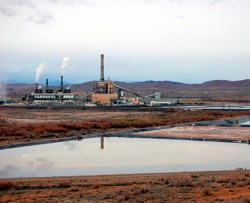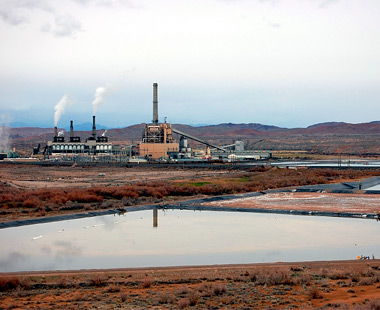
Not one of the affected coal plants.
Midwest Generation, a subsidiary of Edison Mission Energy that runs six coal-fired power plants in Illinois, announced yesterday that it will likely declare bankruptcy — which may or may not lead to all of its plants being shuttered.
It’s been a tumultuous year for Midwest. In February, the company agreed to shut down two plants in Chicago, in a deal brokered by Chicago Mayor Rahm Emanuel at the urging of activists. In March, it announced it was considering closing all six. And then, yesterday’s announcement.
Midwest Generation’s customers are not in danger of having their lights turned off. The region’s grid operator is responsible for ensuring that customers get power and, if necessary, will pay suppliers to ensure power is flowing to homes and businesses. Such arrangements can remain in place as long as needed to prevent blackouts. …
Officials at Edison International, the holding company of both Edison Mission Energy and Midwest Generation, said Edison is not expected to have sufficient cash flow to repay a $500 million debt due in June 2013, and Midwest Generation is in danger of defaulting on leases at Powerton and Joliet [power plants]. Company officials said Midwest Generation also is being squeezed by depressed power prices.
As we’ve indicated several times before, coal is increasingly expensive compared to natural gas, putting coal-fired plants at a competitive disadvantage.
Coal-powered plants are also, finally, starting to have to clean up their pollution, which means another financial hit. Many plants were grandfathered in under the original Clean Air Act, and have been able to avoid upgrades to meet EPA current requirements (like reducing particulate matter) and soon-to-be-implemented ones (like those addressing mercury and carbon dioxide).
Midwest’s six plants (Will County, Powerton, Joliet, Waukegan, Fisk, and Crawford) pumped out 31.5 million tons of CO2 in 2006, and more than 1,484 pounds of mercury the year prior. A 2009 report from the NAACP named the two Chicago plants (Crawford and Fisk) as two of the three worst environmental-justice offenders in the nation, based on pollution and proximity to communities of color. In 2009, five environmental organizations sued Midwest, seeking a reduction in pollution levels; one month later, the EPA and the state of Illinois filed a lawsuit as well.
Understandably, the cost of cleanup is being cited in discussion of Midwest’s current financial straits.
The company must meet state-imposed deadlines that require it to reduce mercury emissions by 90 percent across its Illinois fleet by 2015 and gradually decrease other pollutants by 2019, and federal regulations may move up those deadlines. …
Environmental retrofits of the company’s coal plants in Powerton, Joliet and Will County would cost $628 million, officials said. That figure doesn’t include a $75 million upgrade of one of three units in Joliet that the company isn’t likely to move forward on. Retrofitting Waukegan Station would cost $160 million.
Those costs seem stark. But they pale in comparison to the cost savings that emanated from the plants’ practice of releasing pollutants into the air — passing along the cost of dealing with the mercury to the parents of affected kids, passing along the cost of carbon pollution to all of us.
If the cost of cleaning up your mess means it’s too expensive to do business — sorry that you couldn’t make it in a regulated capitalist system.




